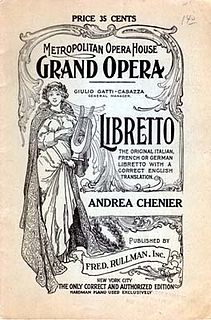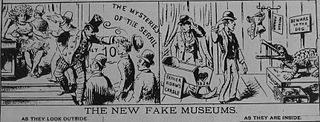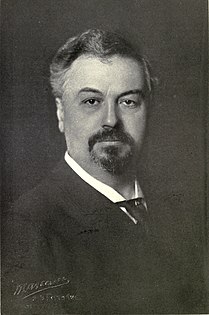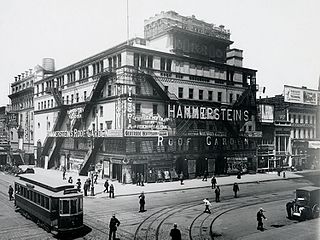
Oscar Greeley Clendenning Hammerstein II was an American librettist, theatrical producer, and theatre director of musicals for almost 40 years. He won eight Tony Awards and two Academy Awards for Best Original Song. Many of his songs are standard repertoire for vocalists and jazz musicians. He co-wrote 850 songs.

Richard Charles Rodgers was an American composer of music, with over 900 songs and 43 Broadway musicals, leaving a legacy as one of the most significant composers of 20th century American music. He is best known for his songwriting partnerships with the lyricists Lorenz Hart and Oscar Hammerstein II. His compositions have had a significant impact on popular music.

Harry Houdini was a Hungarian-born American illusionist and stunt performer, noted for his sensational escape acts. He first attracted notice in vaudeville in the US and then as "Harry Handcuff Houdini" on a tour of Europe, where he challenged police forces to keep him locked up. Soon he extended his repertoire to include chains, ropes slung from skyscrapers, straitjackets under water, and having to escape from and hold his breath inside a sealed milk can with water in it.

Lorenz Milton Hart was the lyricist half of the Broadway songwriting team Rodgers and Hart. Some of his more famous lyrics include "Blue Moon," "Mountain Greenery," "The Lady Is a Tramp," "Manhattan," "Where or When," "Bewitched, Bothered, and Bewildered," "Falling in Love with Love," "Have You Met Miss Jones?," "My Funny Valentine," "I Could Write a Book", "This Can't Be Love", "With a Song in My Heart", "It Never Entered My Mind", and "Isn't It Romantic?".
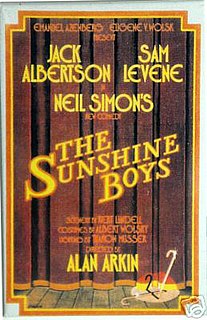
The Sunshine Boys is a play by Neil Simon that was produced on Broadway in 1972 and later adapted for film and television.

The Palace Theatre is a Broadway theatre located at 1564 Broadway in midtown Manhattan, New York City. From 1913 through about 1929, the Palace attained legendary status among vaudeville performers as the flagship of the Keith–Albee organization, and the most desired booking in the country. With 1,610 seats spread over three levels, it is one of the largest theaters on Broadway, housing primarily large musicals and concert engagements. On September 16, 2018, following the run of SpongeBob SquarePants, the theater closed for an extensive renovation, and is expected to reopen in 2021.

Martin Beck was a vaudeville theatre owner and manager, and theatrical booking agent, who founded the Orpheum Circuit, and built the Palace and Martin Beck Theatres in New York City's Broadway Theatre District. He was a booking agent for, and became a close personal friend of the prominent magician, Harry Houdini.
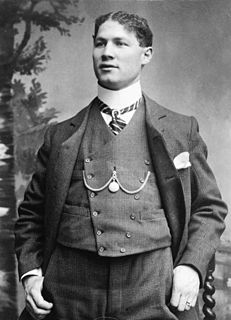
Theodore "Dash" Hardeen, known simply as Hardeen, was a Hungarian magician and escape artist who was the younger brother of Harry Houdini. Hardeen, who usually billed himself as the "brother of Houdini", was the founder of the Magician's Guild. Hardeen was the first magician to conceive escaping from a straitjacket in full view of the audience, rather than behind a curtain.
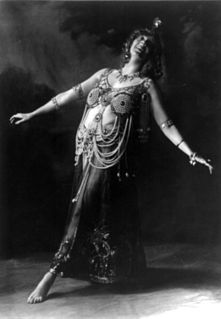
Gertrude Hoffman (1886–1966) was an early 20th-century vaudeville dancer and choreographer.
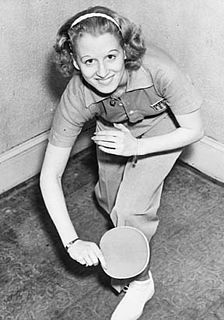
Ruth Hughes Aarons was a US table tennis player, vaudeville entertainer, and talent manager.
The Rialto Theatre was a movie palace in New York City located at 1481 Broadway, at the corner of 42nd Street, within the city's Broadway Theater District.

Hammerstein's Roof Garden was the official name the semi-outdoor vaudeville venue that theatre magnate, Oscar Hammerstein I, built atop the Victoria Theatre and the neighboring Theatre Republic, commonly known then as the Belasco Theatre. Unlike Hammerstein’s first roof garden theatre, which crowned his failed Olympia Theatre, the Paradise Roof Garden was able to rise to prominence and contend with its rivals for the better parts of two decades. For New York City theatre-goers, the name Hammerstein’s grew to encompass both the Victoria and its roof garden. From 1904 to 1914 it was run by Willie Hammerstein, who put on highly popular vaudeville acts.

Ernest Haskell (1876-1925) was an American artist and illustrator, internationally famous in his lifetime and remembered for his etchings, as well as engravings, pen-and-ink drawings, lithographs and watercolors. He was a pioneer in the field of theatrical posters. He created many portraits and caricatures of luminaries of the day. During World War I he was commissioned by the United States Army to develop camouflage painting. Haskell's etchings and intaglio prints are considered by critics and scholars to be his most important contribution.

Bernard Morris Leon Ernst most well known as Bernard M. L. Ernst was an American lawyer, magician and associate of Harry Houdini.





